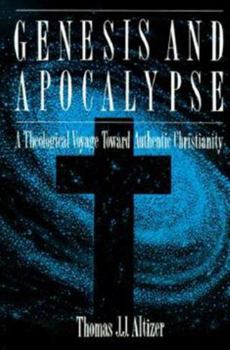Genesis and Apocalypse: Atheology Voyage Toward Authentic Christianity
Select Format
Select Condition 
Book Overview
A Theological Voyage Toward Authentic Christianity This description may be from another edition of this product.
Format:Paperback
Language:English
ISBN:0664221831
ISBN13:9780664221836
Release Date:May 1991
Publisher:Westminster John Knox Press
Length:204 Pages
Weight:0.60 lbs.
Dimensions:0.5" x 6.0" x 9.2"
Customer Reviews
1 rating
Reader beware! God-Is-Dead Theology is not dead!
Published by Thriftbooks.com User , 24 years ago
Many contemporary reviews and articles on Thomas J. J. Altizer's Death-of-God theology read like obituaries; such reviewers have dismissed the radical theology movement as a short-lived, thus deceased and safely inert, product of the sixties. This work shows such pronouncements to be premature. Altizer's appeal, for me, lies in his masterful clarification of the kenotic, progressive, immanent nature of the Christian Word, a Word that announces that the God who alone is God has died in the event of Christ and that the death of this impassive, transcendent, wholly other God -- a God completely detached from the life of history and a complete nullification of everything human -- is in fact a redemptive act and event. Jesus is not God, says Altizer, but God is Jesus. For Altizer, the attempt to return to some putatively "original" expression of the Christian faith, such as we see in fundamentalism and Radical Orthodoxy, is in truth the attempt to reanimate a pre-Christian God and a pagan "Christ" and therefore to deny the Christ who is with us now as the New Adam and who incarnates as the agonizing process of history itself, of which "the historical Jesus," you, and I are but moments. Drawing on such writers as Blake, Nietzsche, Hegel, and Joyce, and provocatively linking them to the Judeo-Christian prophetic tradition, Altizer calls us to the contemporary Christ, the Christ who ever reveals himself in novel and illuminating ways in the whole of human experience by negating his past manifestations and our nostalgic fixations on them (perhaps what idolatry truly is).





